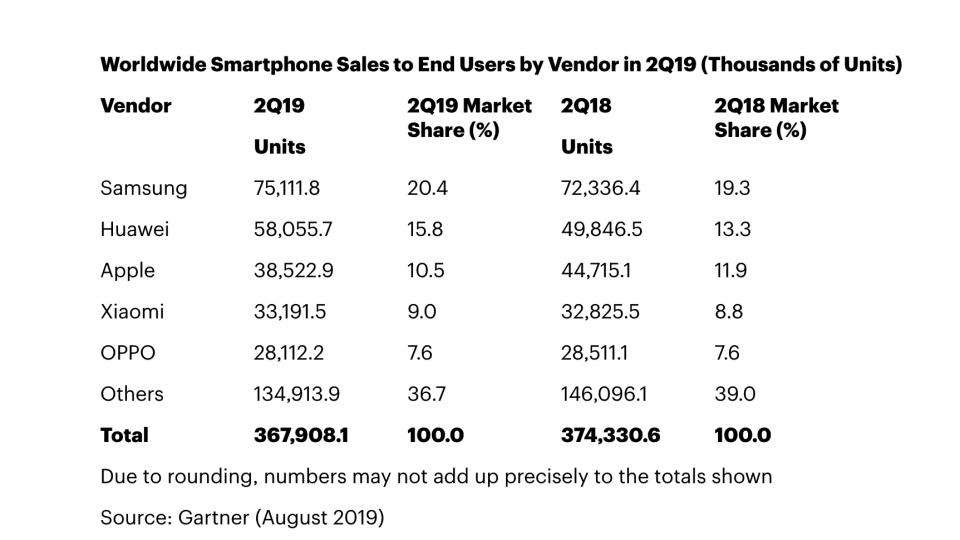While global sales of smartphones are falling, Samsung is bucking the trend. In the second quarter of 2019, the South Korean tech giant shipped more than 75 million phones worldwide, up from 73 million the year before and increasing its market share to 20.4%.
Although this only represents an increase of 1.1% compared to the same period last year, Samsung is one of only two phone makers to have gained ground in recent months while others have faltered. Apple – the third-biggest smartphone manufacturer – suffered the biggest drop, selling a little more than 38.5 million iPhones in the same period, down from 44 million in 2018. Fourth place Xiaomi missed out on three million sales year on year, and fifth place Oppo's sales plateaued.
In total, figures from Gartner show that global sales declined by 1.7% in the second three months of 2019.
Huawei, on the other hand, took second place behind Samsung, increasing global sales by almost ten million and snatching an extra 2.5% of the market share to take its total of 15.3%. This is despite the brand being banned in the US from May and networks in the UK and other regions removing Huawei from their rollout of 5G over trade concerns. This US ban has since been relaxed.

The numbers have been attributed to the fact people want more for their money. "Demand for high-end smartphones has slowed at a greater rate than demand for mid-range and low-end smartphones," said Anshul Gupta, senior research director at Gartner. "To try to boost smartphone replacements, we’ve seen manufacturers bringing premium features such as multi-lens front/back cameras, bezel-less displays and large batteries from their flagship smartphones into lower-priced models."
The Gartner report adds that Apple has failed to innovate and introduce enough incentives to each iteration of iPhone to encourage people to upgrade, while brands like Samsung and Huawei have increased their mid-range offerings and put more typically high-end features on cheaper models.
READ NEXT: Samsung Galaxy Note 10 review
"Too few incremental benefits are preventing existing iPhone users from replacing their smartphones," continued Gupta, whereas "strong demand for Samsung’s new Galaxy A series smartphones and the revamp of its entire entry-level and mid-range smartphone range helped this positive performance."
Apple has instead shifted its attention to services, which made up 21% of its revenue during Q1, which goes some way in negating any drop in hardware. This shift is set to continue with the upcoming launches of subscription services Apple Arcade and Apple TV Plus later this year.
Gartner has predicted global smartphone sales will "remain weak" for the rest of the year and could decline as much as 2.5%, equating to 1.5 billion units sold throughout 2019. Conversely, smart speaker sales are on the up , having increased by more than 55% in Q2 2019.

